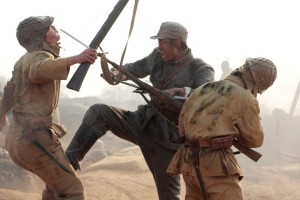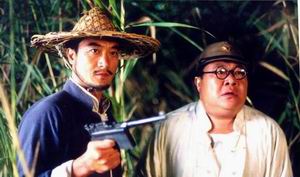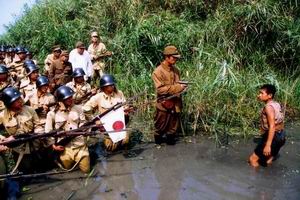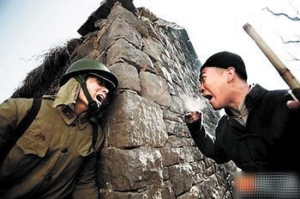Japanese Devils for Hire
- By Peter Harmsen
- 10 March, 2013
- 24 Comments
 Hirotaka Tsukagoshi is the man the Chinese love to hate. His name is not well-known in China, but his face is. Over the past few years the Japanese actor has been in a number of Chinese TV dramas on World War II, invariably appearing in the role of ‘a Japanese devil’.
Hirotaka Tsukagoshi is the man the Chinese love to hate. His name is not well-known in China, but his face is. Over the past few years the Japanese actor has been in a number of Chinese TV dramas on World War II, invariably appearing in the role of ‘a Japanese devil’.
“The ‘devils’ in the dramas aren’t like Japanese. They aren’t even like humans at all,” Hirotaka muses in a report on this special acting niche carried in the Southern Weekend, one of China’s best newspapers.
He is one of a handful of Japanese citizens who have made a living by portraying their grandparents’ generation as monsters, raping and pillaging their way across China. They have ridden on a wave of war dramas that took off in 2005, the 60th anniversary of the Allied victory over the Japanese empire.
Hirotaka was invited to act in a drama right at the start of the wave, but he was not an immediate success with the Chinese directors. For starters, he didn’t have the proper villain look. As the Southern Weekend reports:
“You’re too skinny. You’re not fierce enough. Not like a real devil,” the director said. That was the feedback he got most of the time. “No director told me exactly what a bona-fide devil was supposed to look like,” he said.
Even so, Hirotaka managed to land a job as an extra, and he has been busy ever since. But he has frequently had to compromise. While there is ample evidence of the immensity of Japanese war crimes committed in China during the war, Hirotaka feels he has often been urged to act in an over-the-top manner in order to conform to stereotypes.
Once he acted in a scene shot in the snow. The director wanted Hirotaka to notice a woman at the entrance of a village, jump off his horse and start raping her. “But, director,” he protested, “that’s impossible. It’s so cold today, no one would want to do that in real life.” The director insisted: “You don’t understand. At that time, the Japanese were like that.”
 The Chinese war drama wave has coincided with a worsening of Sino-Japanese relations, culminating in recent months in a series of territorial incidents over a cluster of small islands in the East China Sea, claimed by both countries. As the tension has increased, it has spilled over from high-level politics into the general public. China was the scene of a number of furious anti-Japanese demonstrations last year.
The Chinese war drama wave has coincided with a worsening of Sino-Japanese relations, culminating in recent months in a series of territorial incidents over a cluster of small islands in the East China Sea, claimed by both countries. As the tension has increased, it has spilled over from high-level politics into the general public. China was the scene of a number of furious anti-Japanese demonstrations last year.
Recently a snack restaurant in Beijing took diplomacy into its own hands, deciding to punish all nations engaged in territorial disputes with China by posting the following message, in flawed English, at its entrance: “This shop does not receive the Japanese, the Philippines, the Vietnamese and dog.”
Hirotaka, too, has felt the anti-Japanese sentiment lingering in the Chinese population. In Southern Weekend, he describes an episode that occurred while he was acting in a scene in which he was taken prisoner by the residents of a village:
He was lying on the ground, pretending to have passed out, and was waiting for the director to shout ‘Cut!’ Suddenly an old woman ran up and grabbed his neck tightly, shouting at the top of her lungs: ‘You little Japanese devils!’ The director was confused for a short while, believing that one of the villagers had been hired as an extra. But then he noticed the expression on Hirotaka’s face and quickly had the old woman dragged away.
No one with even a superficial knowledge of Japanese behavior in China during the war can fail to understand the feelings of the Chinese. But the emotions have been whipped up even more by constant exposure to the official black-and-white version of the historical events, not just in pop culture, but also in the textbooks used throughout the educational system.
At the same time, however, it would be wrong to see public opinion in China in monolithic terms. While China has its fair share of jingoism, there is also room for reflection. The remarkably frank Southern Weekend article is an example of that. So is much of the online reaction to the sign in the snack restaurant: Widespread uproar at the racism it exposed.

 Copyright © 2025
Copyright © 2025
Leave a Reply